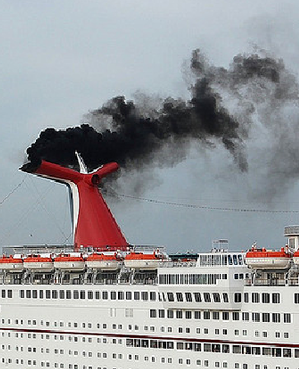Ships in Caribbean to face penalties over emissions
 (Bloomberg): US Federal officials are looking to clear the air in two US Caribbean territories by requiring cruise liners, tankers and other large ships in the region to reduce their emissions or face penalties. The plan is to take effect in late 2013. It will target ships traveling in waters around Puerto Rico and the U.S. Virgin Islands, which have some of the busiest ports in the Caribbean, Judith Enck, regional administrator for the U.S. Environmental Protection Agency, said Wednesday. "There is a real problem with local pollution," Enck said. The Port of San Juan in Puerto Rico sees more than 1 million cruise ship passengers every year, along with nearly 3,800 cargo ships laden with 11 million metric tons of goods.
(Bloomberg): US Federal officials are looking to clear the air in two US Caribbean territories by requiring cruise liners, tankers and other large ships in the region to reduce their emissions or face penalties. The plan is to take effect in late 2013. It will target ships traveling in waters around Puerto Rico and the U.S. Virgin Islands, which have some of the busiest ports in the Caribbean, Judith Enck, regional administrator for the U.S. Environmental Protection Agency, said Wednesday. "There is a real problem with local pollution," Enck said. The Port of San Juan in Puerto Rico sees more than 1 million cruise ship passengers every year, along with nearly 3,800 cargo ships laden with 11 million metric tons of goods.
Some 800 cruise ships arrive every year in nearby St. Thomas, which is the largest cruise port in the U.S. Virgin Islands.
Under the plan, ships will have to use cleaner fuel or install special equipment to reduce air pollution.
Category: Science and Nature


What about all of the dirty trucks that haul the rock & marl belching out their dirt and the so called road worthy cars/SUV’s here on the Island?? Shouldn’t they all be included in emmissions testing?? Include it in the vehicle inspection & see how many disappear! It is bad for our environment too. I beleive they have been doing this in the UK for many years. Just a thought.
In Switzerland it is obligatory to have your carbon monoxide emissions checked every 2 years, and it costs about $50 each time, money which goes to the "clean air bill" or whatever it is called. But due to this, one NEVER sees cars or trucks belching out black smoke.
Shame the Net News archives are no longer available.
We tackled this issue over three years ago and got complete (can I use this?) BS from the cruise company.
The allegation at the time, which was denied and never proved, was that certain cruise ships were burning either garbage or waste oil rather than taking it back to their home port for proper disposal. The worst offenders were owned by the same operator as the one pictured above, in fact my photo could well have been of the same vessel.
The excuse we got boiled down to the smoke being blamed on temporary ‘technical problems’ – this despite the fact that it had been going on for months.
I can’t remember the exact quote we got but it was quite obvious they didn’t give a damn about how much of this stuff ended up in the seas as long as they didn’t have to account for it. The bottom line was that if the vessel emitted visible smoke in US territorial waters they ended being fined, if it happened in Cayman waters that was OK.
This is getting rather like the state of the aviation industry a few years ago. As the older, noisier, dirtier jets were banned from North American and European air space they ended up serving areas where public concerns about pollution were outweighed by financial considerations.
I understand that some of the older cruise ships operating in the Caribbean are in the process of being re-flagged and/or moved out of US ports – this is probably why.
are chubby, sunburned people walking around town in their underwear considered an emission?
The dirtier ships will run our way to avoid the US laws… All that belching diesel settles on the water, goes into the fish. I’ve tested the fish locally here and it’s significantly higher in Mercury than other fish in supposedly dirtier waters. That’s not a coincidence. You can do the tests yourself with Great Plains Labs. The winner here is Anguila which will see cleaner seas. The uneducated will always be willing to trade their health and the health of their children for the almighty dollar. Sad truth.
GOOD!